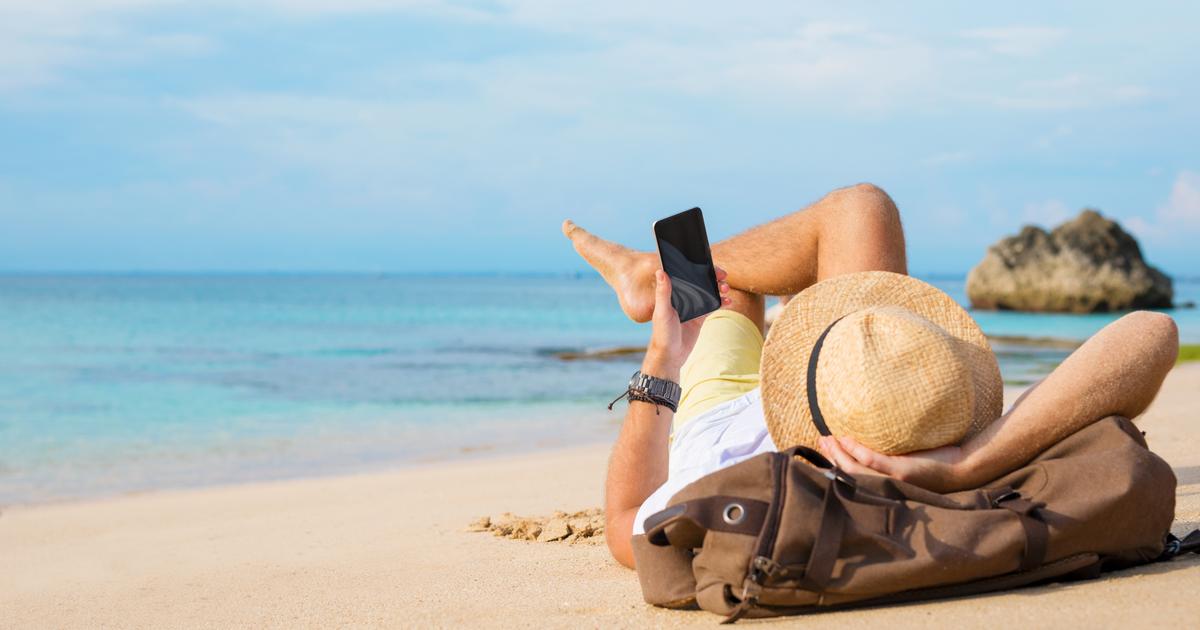It's stronger than them: like one in two French people*, Valentine and Louis do not plan to be on holiday without staying connected. For Valentine, a 25-year-old journalist, it's systematic: she scrolls through her Instagram news feed as soon as she "is in a moment of hollow". When travelling, it can be in the morning while having her coffee, in transport, at noon when she waits for her dish at the restaurant, in the afternoon when she laze on the beach, in the evening when going to bed... "A little bit all the time," she sums up. And often, coupled with the desire to scroll frantically, she feels the irrepressible urge to publish. A beautiful landscape, a mouth-watering plate, a sunset, a pretty outfit, his boyfriend... Everything is post. "When travelling, it's an average of seven stories a day," says the young woman.
For Louis, a 42-year-old entrepreneur, scrolling for hours is out of the question. On the other hand, the forty-year-old needs to have his smartphone permanently at hand. Holidays, or not. "I realize that if I go 15 minutes without looking at him, I'm going to look for him," he says. His addiction: email notifications, messages, slacks and other media pushes. "Besides, if I see that I don't have notifications for several minutes, I'll turn on my screen to check," says the businessman who receives nearly 250 notifications a day and can't help but process them instantly. "When I receive a message, I respond to it immediately. When I receive the push of a piece of information that interests me, I read the article immediately.
" READ ALSO When traveling, they choose to leave without their smartphones
"Today, we check our phone on average 283 times a day"
But why on earth do we have such a hard time getting off our screens, even during a trip? "In reality, it's normal," says Anne-lise Ducanda, a PMI doctor, a member of the collective against overexposure to screens (CoSE) and author of Les tout-petits face aux écrans: Comment le protection (1). "The algorithms on our smartphones were designed with the help of neuroscientists using a new science called captology. It is the use of all the knowledge we have of the human brain and its weaknesses, in the service of digital technology."
The brain is wired to detect the most striking points in its environment. A sound, a noise, a light... This is what originally allows him to escape danger. Colors, visual or sound notifications stimulate his attention, excite him, make him captive, addicted to these permanent solicitations. Result: travel or not, holidays or not, paradise beach or not, the smartphone has become the favorite activity of the brain. "Today, we consult our phone on average 221 times a day," says the professional. According to the ELABE study published in 2019, 60% of French people say they are unable to do without their phone for a day.
Read alsoKilimanjaro is equipped with wifi to be able to go on Instagram from the top
Digital detox
Faced with this, "as with any addiction", Anne-lise Ducanda recommends imposing strict restrictions on use. And precisely to start this drop in diet during her holidays, strategic moment according to her, "since the pleasure acquired by the phone will be more easily compensated by other activities related to the holidays". To do this, she recommends to warn your loved ones upstream, so that they are less a source of solicitations, not to systematically take your phone with you everywhere (exit the beach and the restaurant for example), to switch your screen to black and white and if you have two phones (pro and personal), not to take the pro in your luggage. A digital detox supposed to allow you to "reconnect with the people with whom you travel, to rest, to see your ability to concentrate tenfold and to occupy yourself differently," according to Anne-Lise Ducanda.
LISTEN TO OUR PODCAST - What's the risk of not putting your phone in airplane mode?
In 2021, aware of her addiction, Valentine deletes Instagram from her phone, for a summer. Result: if at first, taking pictures of landscapes without posting them directly on the application baffles her, very quickly, she appreciates. She even finds time to read and get bored. "I felt like I had more time," she confesses. Louis has never tried to limit himself but is not against it in principle. While waiting for his digital detox, when we discuss the date of publication of the article, he assures: "I will not fail to know, anyway, I would have the push"!
*
Methodology: the survey was conducted online from 11 to 17 May 2022, by the YouGov polling institute, among a panel of 1031 French adults representative of the French national population, aged 18 to 45.
(1) Toddlers facing screens: How to protect them (Ed. Rocher), 18.90 euros.

